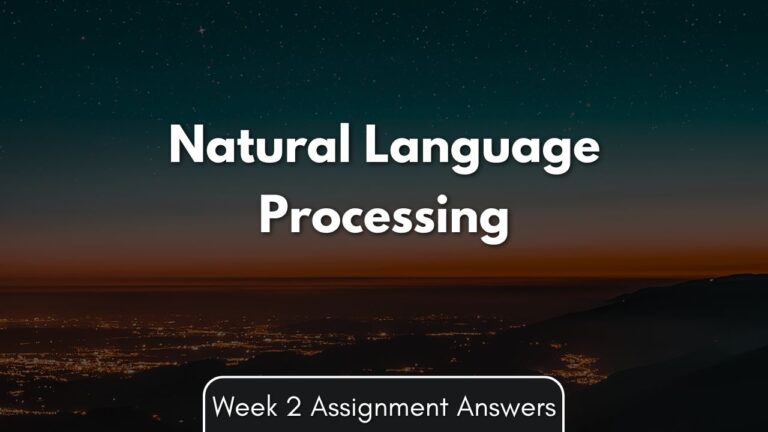Are you looking for expert-verified Emotional Intelligence Week 2 NPTEL assignment answers? You’re in the right place! Below are the answers with clear explanations to help you understand each concept better and boost your preparation.
1. ________________ intelligence refers to one’s ability to notice and make distinction among the moods, temperaments, motivations, intentions of other people potentially to act on this knowledge
Options:
a) Interpersonal
b) Intrapersonal
c) Fluid
d) Crystallized
Answer:✅a
Explanation:
Interpersonal intelligence involves understanding others’ feelings, moods, and behaviors, enabling better interaction and response.
2. According to Robert Sternberg, componential intelligence is the ability to function in a practical way in everyday social situations
Options:
a) True
b) False
Answer:✅ b
Explanation:
Componential intelligence deals with analytical skills, not practical social interactions. Practical intelligence relates more to everyday situations.
3. According to PASS theory _____________ is a concept which is a mental process by which the child determines, selects, and uses efficient solutions to his or her problem
Options:
a) Attention
b) Planning
c) Simultaneous
d) Successive
Answer:✅ b
Explanation:
Planning is central to decision-making and problem-solving, as defined in the PASS theory (Planning, Attention, Simultaneous, and Successive processing).
📚Want Full NPTEL Assignment Support?
If you’re looking for complete, curated solutions with detailed explanations for Emotional Intelligence Week 2 and other NPTEL subjects,
👉 Click here to visit Answer GPT – your trusted learning partner.
4. Cognitive assessment system is developed by Cooper &Sawaf
Options:
a) True
b) False
Answer:✅ b
Explanation:
The Cognitive Assessment System (CAS) was developed by Naglieri and Das, not Cooper &Sawaf.
5. Score of 130 and above in Wechsler Adult Intelligence Scale indicates
Options:
a) Superior
b) Very Superior
c) Bright
d) Average
Answer:✅ b
Explanation:
According to the Wechsler scale, 130+ is classified as Very Superior Intelligence.
6. First intelligence test was created by ______________
Options:
a) Binet and Simon
b) Daniel Goleman
c) Robert Sternberg
d) Cooper and Sawaf
Answer:✅a
Explanation:
Binet and Simon developed the first formal intelligence test to assess children’s mental abilities.
7. Binet’s test is a set of age-graded items
Options:
a) True
b) False
Answer:✅a
Explanation:
Binet’s test includes questions categorized according to age levels, enabling assessment of mental age.
8. Stanford Binet and the WISC-III cannot be used to assess_________ intelligence
Options:
a) Adult
b) Infant
c) Old
d) Adolescence
Answer:✅ b
Explanation:
These tests are not suitable for infants as they are designed for older children and adults.
9. _________________ plays a very important role in the determination of one’s intelligence
Options:
a) Psychosis
b) Epinephrine
c) Culture
d) Cortisol
Answer:✅ c
Explanation:
Cultural context greatly impacts how intelligence is perceived, developed, and tested.
10. Raven’s Progressive Matrices is an example of
Options:
a) Culture-Fair Intelligence Test
b) Personality Test
c) Aptitude Test
d) Emotional Intelligence Test
Answer:✅a
Explanation:
Raven’s test is designed to minimize cultural and language bias, making it a culture-fair test.
11. Which one of the following is NOT the approach of emotional intelligence?
Options:
a) Ability-based approach
b) Personality-based approach
c) Performance-based approach
d) IQ-based approach
Answer:✅ d
Explanation:
Emotional intelligence approaches include ability, personality, and performance, but not IQ-based.
12. Ability model was given by Salovey and ______________
Options:
a) Mayer
b) Daniel
c) Seligman
d) Sonja
Answer:✅a
Explanation:
The ability model of emotional intelligence was introduced by Salovey and Mayer.
13. _____________ is the first person to come up with a global tool of emotional intelligence measure
Options:
a) Reuven Bar-On
b) Daniel Goleman
c) Peter
d) Seligman
Answer:✅a
Explanation:
Reuven Bar-On developed the EQ-i, a global assessment of emotional intelligence.
14. Goleman says that emotional intelligence is the capacity for recognizing our own _____ and of others.
Options:
a) IQ
b) Performance
c) Trait
d) Emotions
Answer:✅ d
Explanation:
Goleman emphasizes awareness of emotions — both our own and others’ — as the core of emotional intelligence.
15. Emotional understanding means one’s ability to solve emotional problems.
Options:
a) True
b) False
Answer:✅a
Explanation:
Emotional understanding helps in recognizing, interpreting, and managing emotional challenges effectively.
✅Conclusion
We hope this guide helped you understand all the correct answers with explanations for Emotional Intelligence Week 2. For more assignment help across all NPTEL subjects:
👉 Visit Answer GPT – Emotional Intelligence Week 2 NPTEL Assignment Answers


